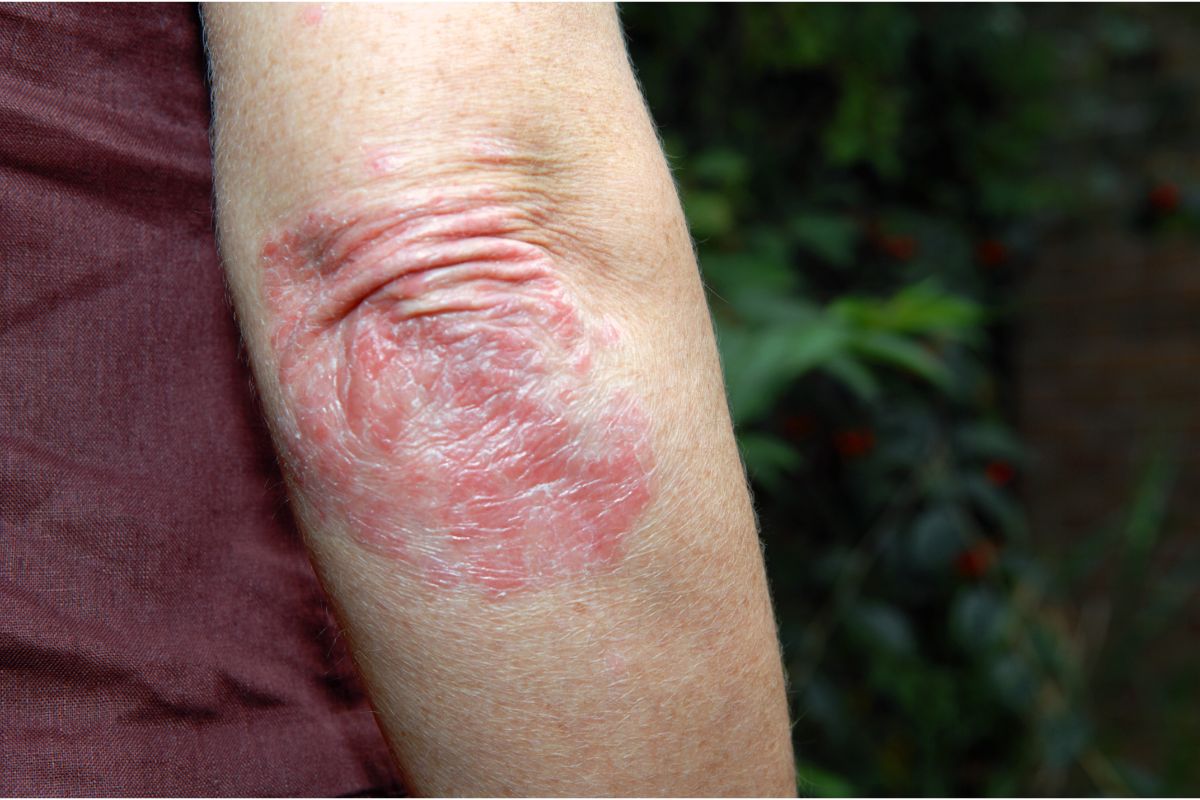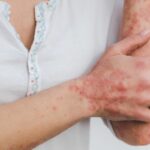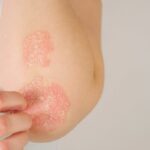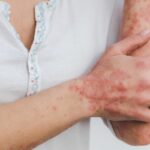The variety of psoriasis treatments available can be confusing and intimidating, but one area that you will quickly realize is useful to you is moisturizing, as it is the only therapy that can aid all patients, no matter the severity of their skin lesions.
Psoriasis sufferers must follow a regular moisturizing routine. If you have psoriasis, you want to prevent new flare-ups as well as protect your present patches from getting worse.
Here are 10 of the best creams that you can use to help with your psoriasis and the flare-ups that you may be experiencing.
10 Best Creams for Psoriasis Flare-Ups
OUR TOP PICK
This cream contains 2% salicylic acid to help treat redness, scaling, and flaky, dry skin, lactic acid to exfoliate gently, niacinamide to relax skin, and three vital ceramides to help preserve the skin's barrier.
It is also fragrance-free, which helps to relieve itching, redness, and scaling while also making skin less irritated and more comfortable.
Pros:
- Doesn’t clog pores – some moisturizers are quite thick and will therefore block pores and cause breakouts.
- Fragrance-free – being fragrance-free makes it less likely to itch and cause a breakout when applied.
Cons:
- Small Packaging – This cream comes in small 80z tubs which can lead to having to replace it more frequently.
EDITORS CHOICE
This is another lotion designed exclusively for psoriasis sufferers. This salicylic acid-infused moisturizer is supposed to be used in conjunction with MG17's Coal Tar Ointment.
The salicylic acid softens and removes scales, while the coal tar slows skin cell proliferation. Provitamin B5, shea butter, avocado oil, and aloe extract are then combined to give moisturizing relief.
MG217 Medicated Salicylic Acid cream is also fast-absorbing and non-staining, allowing you to return to your other chores in just minutes of application.
Pros:
- No stains – you do not have to worry about this cream accidentally bleaching or staining your clothes.
- Fragrance-free – is gentle on the skin and does not cause any irritation.
Cons:
- Doesn’t perform as well alone – if you want to experience the full benefits of this cream then you will have to use it alongside the coal tar ointment made by the same company.
Also available at Wallgreens.
BEST VALUE
This ointment is dermatologist-recommended and particularly developed for persons with psoriasis.
It is safe to use with drugs such as steroids given by your doctor. The key element in this recipe is coal tar, which is ideal for slowing excessive skin cell formation.
This lotion is effective at alleviating itching, redness, flaking, and other psoriasis symptoms. It is eligible for funding from health savings accounts (HSAs) and flexible spending accounts (FSAs).
Pros:
- Works quickly – you will see results in your psoriasis in just a matter of days.
- Reduces psoriasis flare-ups – the chances of the psoriasis flaring up again is reduced if you use this cream regularly.
Cons:
- Gasoline smell – some users have said that they get a smell of gasoline from this cream when applied.
RUNNER UP
This multi-purpose soothing lotion hydrates and soothes cracked, chapped, chafed, and dry skin irritations. This skin protectant is non-greasy and aids in the protection and relief of dry skin, including psoriasis.
It possesses antibacterial and sebum controlling characteristics, making the Cicaplast Baume B5 a good choice for acne-prone skin that is prone to irritation. It has also been demonstrated to have good wound-healing properties.
Pros:
- Anti-inflammatory properties – with ingredients such as shea butter and madecassoside, this cream works great as an anti-inflammatory with continuous use.
- Softens skin – your skill will feel nice and smooth and overall, healthier.
Cons:
- Leaves a white shine – even after rubbing it in, you will still be left with a bit of a pale, shiny sheen on your skin.
Also available at Ulta.
RUNNER UP
This water-activated solution is ideal for dry and itchy skin and is applied to moist skin shortly after bathing when your pores are open and ready to absorb hydration.
This enables the cream to penetrate deeper into the skin's surface, delivering moisture to the source of the dryness and irritation.
This product also contains a patented ceramide complex, which helps to maintain the skin's natural barrier and minimizes dryness. It has no additional perfumes and should be applied to damp skin shortly after showering.
Pros:
- Penetrates the skin – this cream focuses on treating the root of the problem instead of just moisturizing the surface.
- Non-greasy – you can put this cream on and you will not feel any residue, making it possible to put clothes on straight away without it transferring or sticking.
Cons:
- Can cause allergic reactions – the cream contains citrus oil which some people may be allergic to.
Also available at Walmart.
RUNNER UP
This lotion exfoliates dead skin cells with salicylic acid, ceramides, and gluconolactone. Vitamin D, shea butter, and aloe are also included.
Because it calms the surface while delivering optimum moisture to permeate deep into the barrier, it works well for psoriasis areas around the knees, a frequent place for the skin condition to grow.
Customers report that their psoriasis patches drastically improve within days of using the product.
Pros:
- Cheap – you will not have to pay anymore than $10 for this cream.
- Fragrance-free – will not irritate skin or emit medicated smells.
Cons:
- Thick consistency – this may make it hard for some people to apply to their skin.
Also available at Walmart.
RUNNER UP
Instead of a cream, this product is a skin balm that works effectively at trapping moisture in the skin. It also includes chemicals that help to heal the dry cracks caused by psoriasis.
If your psoriasis flares up during the chilly winter months, try switching to this heavy duty ointment.
Keep in mind that this balm has a similar feel to petroleum jelly (Vaseline) and may transfer onto your clothes if not allowed to dry.
Pros:
- Fragrance-free – very gentle on skin and is also hypoallergenic – making it very accessible for those with allergies or sensitive skin.
- Locks in moisture – this cream is especially great during the winter months as this is when psoriasis gets very dry and cracked.
Cons:
- Vaseline-like consistency – you will have to wait a few minutes for the balm to soak into your skin as it can be a bit greasy.
RUNNER UP
Long-lasting moisture is provided with this cream, which also aids in restoring the skin's ideal levels of hydration. It contains plenty of emollients which help the skin stay hydrated for up to 24 hours.
It works to get back the skin's natural smoothness through 24-hour high hydration, making it the perfect body lotion for dry or very dry skin.
The lotion absorbs fast into the skin without leaving a greasy or heavy sensation and also aids in reducing the irritation brought on by dryness.
Pros:
- Works quickly – you will notice a great decrease in your itchiness and redness with just a day or two of applying this lotion.
- Non-greasy – it feels very light on the skin and will not get your clothes or surfaces greasy
Cons:
- Expensive – this is not as budget friendly as other psoriasis creams and will cost you at least $30.
Also available at ISDIN.
RUNNER UP
This topical medicine is only accessible with a prescription. It has a prescription-strength corticosteroid in it to help with itching, swelling, and irritation.
It also includes vitamin D, which reduces skin cell proliferation before plaques form.
This lotion may also make you more sun sensitive. Limit your exposure to the sun. Sunlamps and tanning salons should be avoided.
Pros:
- Heavy duty – if you have a particularly bad case of psoriasis, then this cream should be able to treat it.
- Prevents plaques from forming – the vitamin D makes the plaques of skin form a lot more slowly.
Cons:
- Sun sensitivity – since it is quite a strong formula, you should not stay in the sun for prolonged periods of time as it can make your skin more sensitive.
RUNNER UP
This lotion's major active constituents include urea, glycerin, ceramides, and lactic acid. These are the main elements.
Urea is a powerful exfoliator that loosens dead skin, while glycerin is a potent humectant that draws moisture to the skin, keeping hair follicles and skin hydrated.
Pros:
- Works quickly – it will only take a matter of days for you to experience the beneficial effects of this lotion.
- Loosens dead skin – the build up of skin which causes plaques will fall away and allow your healthy skin to breathe.
Cons:
- Increase sun sensitivity – this lotion contains Alpha Hydroxy acid which can make your skin more prone to sunburn so wear sun cream and protective clothing when out in the sun.
Best Creams For Psoriasis Flare-Ups Buying Guide
The Importance of Using Psoriasis Creams
People with psoriasis who adopt a daily bathing and moisturizing practice will notice that it not only reduces scaling, but also relieves irritation and keeps psoriasis patches looking their best.
All of the additional advantages will be enhanced if you moisturize on a regular basis. First, continuously hydrated skin not only feels better but is also stronger and better equipped to resist cracking and other harm.
Even slight skin injury can cause a flare-up in the same region for a substantial proportion of persons with psoriasis, a trigger known as the Koebner phenomenon. As a consequence, it's best not to scrape your psoriasis spots too forcefully.
Second, keeping inflammatory psoriasis patches wet helps to release scales, which is aided by occlusion, which entails covering afflicted regions with heavy cream or lotion, wrapping the area in plastic wrap or cloth, and leaving the covering on overnight.
Cosmetically, moisturized psoriasis appears better, and the remaining scales are partially covered.

What Is a Psoriasis Flare-Up?
Symptoms of psoriasis usually come and go for most people. Psoriasis flares can be triggered by a variety of reasons, including stress and particular weather conditions.
People with psoriasis frequently have phases of remission, when symptoms are minor or non-existent, and flares, when symptoms are more severe. Many people discover that certain variables raise their risk of a flare.
Psoriasis is unique to each individual. What causes symptoms in one individual may have little or no effect on another.
An imbalanced diet with too much red meat or simple sugars, excessive alcohol use, stress, infection, skin injury/trauma, and medication are all common causes of psoriasis flare-ups.
What To Avoid Putting On Your Skin When You Have Psoriasis
As important as it is to know what is good for your skin with psoriasis, it is equally important to know what is NOT good for your skin. By learning these things, you will be able to avoid flare-ups.
Tattoos
Getting a tattoo requires making small wounds in the skin. A psoriasis flare-up can be triggered by recurrent damage. Even if a person does not have active plaques, some tattoo artists may refuse to tattoo someone with psoriasis.
Tattoo artists are even prohibited in several areas from tattooing those who have active psoriasis or eczema.
Despite the hazards, some psoriasis patients obtain tattoos. If you're thinking about getting a tattoo, always consult with your dermatologist beforehand.
Heavy Clothes
Consider wearing light materials that will not irritate your skin. Heavy textiles, such as wool, might irritate your already sensitive skin and make you itchy.
Choose textiles that are easier on your skin and enable it to breathe, such as cotton, silk blends, or cashmere.
Products That Contain Alcohol
It is very important that you keep your skin moisturized by using creams and other topical products. Psoriasis symptoms are frequently exacerbated by dry skin.
However, you should exercise caution when selecting a lotion, since many include substances that might further dry up your skin.
Alcohol is one of the leading causes of dry skin. Alcohols such as isopropyl alcohol, ethanol, and methanol are frequently used in lotions to make them feel lighter or as a preservative.
However, these alcohols can dry up your skin's natural layer, making it harder to retain moisture.
Sulfates
Sulfates are commonly included in toothpastes, shampoos, and soaps to aid in foaming. However, certain sulfates can lead to skin irritation, particularly in those with sensitive skin and disorders such as psoriasis.
Fragrance
Fragrances are used to enhance the aroma of items. However, they might cause skin irritation in certain people.
When selecting a skin care or hair care product, look for one that is fragrance-free to prevent aggravating your psoriasis. Also, avoid spraying perfume directly on your skin.
Too Much Sun
You may have heard that vitamin D from the sun is good for your skin. Sunlight's ultraviolet (UV) rays limit skin cell proliferation, which is beneficial for psoriasis.
Aim for 20 minutes at a time and always wear sunscreen. Sunburn may aggravate your psoriasis symptoms and raise your risk of skin cancer.
Hot Water
Use warm water instead of hot water for bathing or showering. Hot water is extremely drying and irritating to the skin.
The American Academy of Dermatology suggests only taking one shower or bath each day. They also advise restricting showers to five minutes and baths to 15 minutes.
If you are still a little bit lost on what to look for in your psoriasis creams, lotions, and gels then you should consider the following factors.
Ingredients
When purchasing psoriasis creams, carefully study the labels for potentially irritating substances such as sulfates, parabens, fragrance, or alcohol.
Some products include them, but in little amounts that your skin may accept. This is determined by the intensity of your symptoms.
It's also a good idea to look over the ingredient list for known allergies. A patch test can be used to check for any irritation or allergic responses to a psoriasis cream.
Type
Since psoriasis is a very individual skin condition, certain treatments may not be effective for other people. The kind of lotion you can use also fits into this category.
Look for anything with petroleum jelly if you like a greasier treatment and have discovered that it soothes your spots more effectively.
Avoiding chemicals like petroleum jelly is preferable for persons who find greasier lotions bothersome.
Place of Application
Paying attention to the location of your psoriasis and utilizing treatments correctly will help you treat the skin disease more effectively.
For example, if you suffer from psoriasis of the scalp, you should use a hair-specific lotion or shampoo/conditioner.
This is due to the fact that some psoriasis body creams may really remove hair color and cause damage.
Furthermore, most psoriasis creams aren't delicate enough to be used near the eyes, for example.
If you need to address problems around the eye, you'll need a solution made particularly for this sensitive area.
Consult your dermatologist if you are unsure which product is ideal for your individual circumstances.
Frequently Asked Questions
Is Only Using Cream Enough to Treat Psoriasis?
What works for you now may no longer work for you a year from now. Topicals, such as lotions and ointments, can be quite successful at alleviating or even eliminating symptoms. They are not, however, a cure.
Avoiding triggers can assist improve the efficacy of topical therapies. In some cases, they may be more useful when paired with recommended drugs and dietary adjustments.
How Do You Know If Psoriasis Is Healing?
A decrease in the amount of itching you experience is one of the most telling symptoms that your psoriasis is in remission.
You may discover that you may need less topical drugs, such as creams containing steroids, to relieve irritation and inflammation on your afflicted skin.
Symptoms may not go away completely for everyone. Some people's symptoms may fade to the point where they are no longer bothersome. Depending on your experience and background with psoriasis, this may still be considered remission.
How Often Should You Apply Psoriasis Cream?
It is advised to use a psoriasis moisturizer once a day, or twice a day if your skin is especially dry and damaged.
However, because products differ, you should read the manufacturer's instructions and consult with your doctor if you are still unsure.
Does Psoriasis Get Worse With Age?
Psoriasis is a chronic skin disorder. Although psoriasis does not worsen with age, you may have whole-body issues — from aging skin to linked health concerns — that may indicate that your psoriasis therapy has to be adjusted as you get older.
You may also notice that your psoriasis flares more frequently throughout menopause.
Can Psoriasis Go Away on Its Own?
Psoriasis may go away without therapy. It is also possible to experience spontaneous remission, or remission that happens without therapy.
In such instances, your immune system has most likely stopped attacking your body. This permits the symptoms to diminish.
This does not imply you will never experience another flare. Keep an eye out for psoriasis symptoms so that you can begin treating them if they reoccur.
Psoriasis is unpredictable, and there is no timetable for remission. Remission might last for a long period.
You may not notice any signs for months or even years. Remission might also be transient. You may re-experience symptoms within a few weeks of their disappearance.
Summary
There are many different creams, lotions, balms, and gels out there which can be used to greatly improve your psoriasis by locking in moisture and healing cracks caused by the condition.
However, every psoriasis case is different and should be treated as such. If a cream works for one person, there is no guarantee that it will work for the next.
Once you find that perfect cream though, you will find that the redness, itchiness, and dryness caused by your psoriasis will be greatly improved and you can go about your life again.
You should also be reminded of the fact that topical creams will help but in order to truly prevent flare-ups in the first place, you should make changes to your lifestyle such as not drinking too much alcohol, managing your stress, and protecting your skin from injuries such as scrapes and cuts.
- Understanding Male Reproductive Health: A Complete Guide - February 2, 2025
- Simple Healthy Skin Habits for Radiant Skin - December 6, 2024
- Unlocking the Connection Between Nutrition and Mental Health - December 3, 2024


















